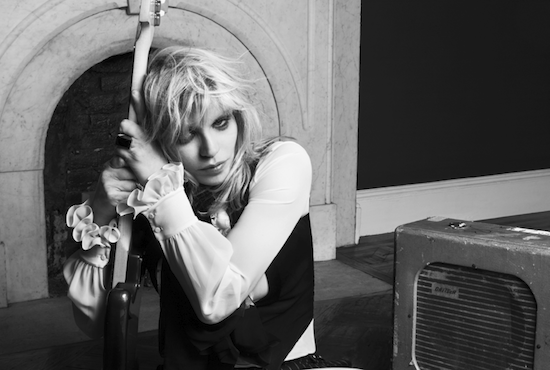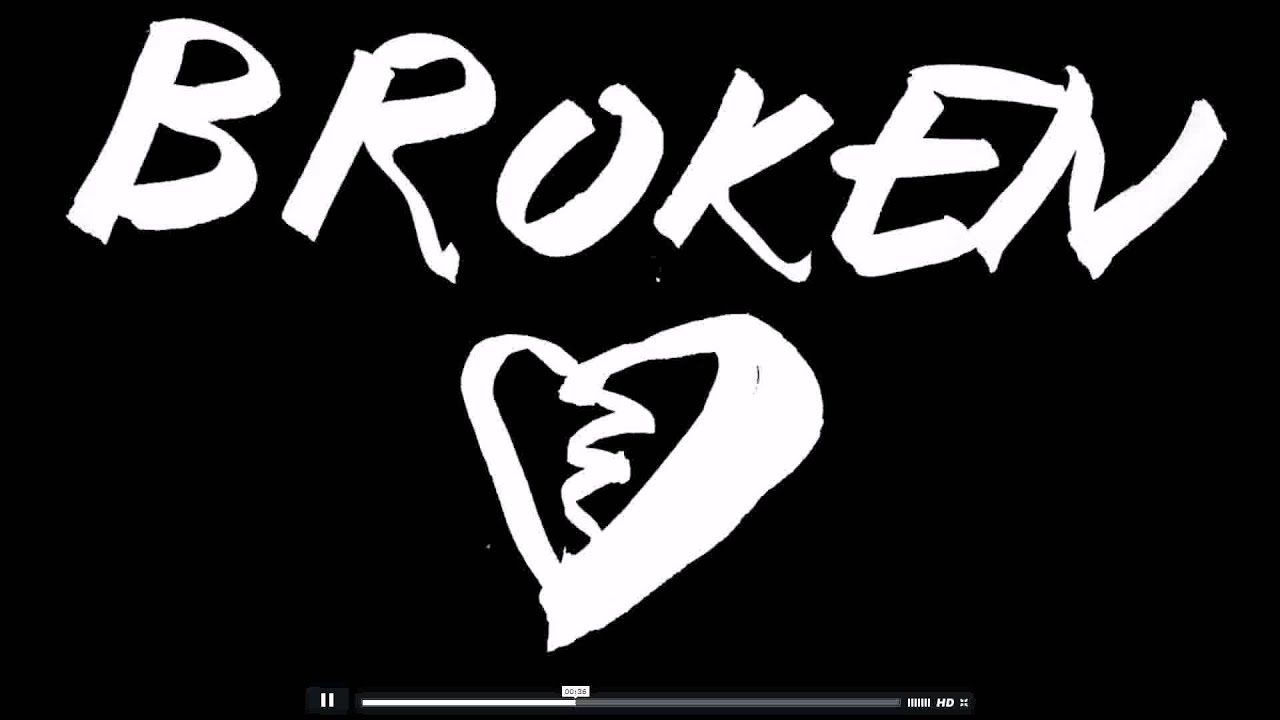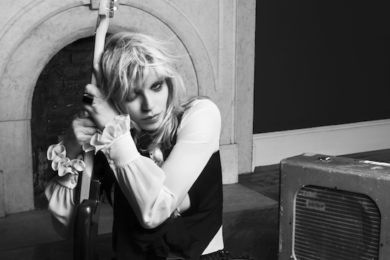Talking to Courtney Love is an experience. Curled up like a cat in a Liberty scarf, nestled in the corner of a chichi members’ club, she introduces herself, and explains she’s tired, so "sorry if my answers are laconic."
In fact, she’s far from laconic: over the next hour, her characteristic wry stream of consciousness barely falters. She’s funny and cute, delivering deadpan lines and then mugging, eyes wide, for emphasis. She is deeply removed from the image many have of her – the recklessness of her performances, the desperation of her lyrical voice. This is Courtney in business mode, with a new single and UK tour to promote, freshly reinstalled in Hollywood and ready to re-enter the world of movies and public appearances.
That’s not to say she isn’t honest. Her recent work – a spoken word piece for Garage magazine, guest spots with Fall Out Boy and longtime friend and creative foil Michael Stipe – is characteristically raw. She’s still generous with her life and her ideas, and the pleasure she takes in her luxuries is infectious: she shows me her perfume, her monogrammed notebooks, her Miu Miu platforms. Given her difficult family background, her early homelessness and the incredible drive she had to redraft the terms of her life, it’s impossible to resent the joy she now takes in her taste. And she’s still ruffling feathers, insisting that I join her on the tiny, overstuffed sofa, because a man at a nearby table has complained about the volume of her voice.
You’re touring the UK next month for the first time in four years. Are you bringing the same band?
Courtney Love: Basically, yeah. No, we have a different drummer.
Will you be bringing [bassist] Invisible Dave?
CL: No, Invisible Dave is not playing on this tour. This is a guy that came from my daughter’s fiancé, Isaiah [Silva], from his band pool. Micko [Larkin, Love’s guitarist] and Isaiah are the same age, and they both grew up on Oasis, so I think they bonded over that. Isaiah has a band called Gateway Drugs, they’re great, impeccable. And he’s a saint. I’m really shocked that I love him so much, but he’s who you want your daughter to date. He’s Jared Leto cute. He’s so cute. And he’s really really really good, too. He’s so sweet, and [chuckles] she’s got a lot of my temperament. She’s feisty. Temperament and a trust fund, so.
Will you be bringing new material?
CL: Yeah, ’cause ‘Wedding Day’ [Love’s new single] will be out by then. It got mastered this weekend. So it should be out any day. Howie Weinberg, who mastered Nevermind, mastered it. I wrote this song after just months and months of trying to write and trying to write, and then this one song just came in twenty minutes. It just came in like a bolt from 18. I wish I had written this in 1990, 1983 even. You know what I mean? It’s just that song, it’s that good.
What is your writing process like now?
CL: Well, you sit and you write like, Queens Of The Stone Age drudge for a month, and it’s just not happening, and it’s not happening – not that Queens Of The Stone Age suck, but people expect a lot more from me. Josh Homme can play like, four notes on his bass and people take off their tops, but I have a higher bar for whatever reason. It has to be just fucking really really good. So, then I started playing with Patty [Schemel] and Melissa [Auf der Maur] and Eric [Erlandson], just to see how that was, if we got anything killer happening.
You’re playing with the Celebrity Skin-era lineup of Hole again?
CL: Yeah. We already rehearsed, like, three times in the last week. So that’s partly why I’m tired, is because I’ve been doing that, and also trying to get out of movie star jail at the same time. That’s a tough one, it’s so hard to do. The Faustian stuff that goes on, it’s a whole situation. But I think I’ll do it. It’s based on who you know, what movie stars you know, what writers and what directors you know.
[Club owner comes over, greets Love enthusiastically; they gossip]
So you know everyone, apparently.
CL: Yeah, this is probably my favourite place on earth. Best money I ever spent. They were like, you don’t ever have to be a member, and I was like, well one day I might be irrelevant. I’m gonna buy the membership. So I got two people to vouch…
No one blackballed you?
CL: Oh god, no. I got through in three days. But I got two aristos to vouch. I have a little toff system going on.
I remember the old story about you having tea with Prince Andrew.
CL: He’s a nice enough fellow. Nothing happened: I made him really nice tea and I made him drink out of a mug with his mother on it, which I thought was hilarious. And then he said: "So what do you do all day?" The NERVE.
We were talking about your writing process. I was listening to the spoken word piece you recently wrote for Garage magazine. It’s incredibly dark and hopeless.
CL: I wrote that in one take. I wrote it in five minutes. You just turn on the angst spigot, it’s never ending. I’m like, just go suicidal.
Is despair your subject?
CL: Yeah, I would say that my currency is more despair than rage. I think I’m good at both. But I’m really terrible at a straight love song. I’ve tried.
I remember reading that when you recorded ‘Heaven Tonight’, you had to clear the studio to sing the words "I love you".
CL: Mm-hmm.
Why is that difficult for you?
CL: I don’t know. Just, growing up on Dylan, and then the first two or three twisted PJ Harvey records, and Patti Smith, and even REM, you know? To me, ‘Positively 4th Street’ is a love song. ‘Tangled Up In Blue’ is a love song. Even the Bunnymen stuff. I remember in 1992 listening to Ocean Rain and thinking, "Yeah, I can write like this." I can write Bunnymen songs, but I can’t write Pumpkins songs. Do you know what I mean?
Sort of, but when you talk about having an angst spigot, I can’t help but think you’re being a bit glib. How comfortable are you with performing tragedy, really?
CL: Really comfortable. But I also think I’m super funny, so I think I can do both, I think I can flip it and be witty. You know, I think it comes out in the covers, it comes out in [onstage] banter. In like, 94, 95, I think I talked too much. I would talk for like five minutes between songs. Which I don’t do anymore. In 1994, it was probably cathartic and interesting, but now it’s indulgent. So just get to the rock & roll and play, and if you want to make a fucked up joke in between songs, go for it, but I don’t need to tell you my life story.
OK, so if despair is your subject, are places your characters? You’ve written very strongly about place throughout your career, from ‘Olympia’ to ‘Malibu’.
CL: Yeah. I wrote a New York song that I tossed out, actually. It had Bleecker Street in it, with the line, "And then she jumped into the Hudson/ Even though no one was watching." It just didn’t have a good enough chorus. "And you’ll find her down on Bleecker Street…"

And I was reading that you’ve written a new song called ‘California’.
CL: No, I changed my mind on ‘California’, I tossed it. I feel like ‘California’ got too precious, and then I was into ‘Californication’, and I hate to admit this, but the lyrics of ‘Californication’ are just better. Even though ‘Californication’ is ripping on ‘Celebrity Skin’, which is what it’s doing. Still – I grew up with those guys, I went to Fairfax High with those guys, if it wasn’t for Flea I wouldn’t even have a band [early Hole used to rehearse in Flea’s studio in Los Angeles].
Certain songs about place are just super important to me. Like, I hear a song about San Francisco, by Journey, called ‘Lights’, and I always go nuts, because I know it’s about San Francisco. Even if I’m not living where I write, it always affects me. You’ve got ‘Pacific Coast Highway’, you’ve got ‘Malibu’, you’ve got all of Celebrity Skin – there are like four or five songs on that record that are my Raymond Chandler Los Angeles songs. You know, because it doesn’t give back, but I just am fascinated by the place. I moved back recently, I live there now, actually.
I wondered whether you might. I didn’t see you staying in New York, somehow.
CL: It was six years in New York, though. I did socialite things that nobody saw. I made an amazing record [Nobody’s Daughter], but it sold about two copies and it failed. So I just became a socialite for a while and dated a lot of people. They couldn’t have tattoos, that was the criteria. I dated a billionaire. Just to say I did it later.
And how was he?
CL: Into Springsteen.
I’m so sorry.
CL: No, it’s OK. You know what? Most American people without tattoos are into Springsteen.
Maybe less places as characters, then, more… songs about place as transmissions in each city’s private language? I could easily read ‘Celebrity Skin’ that way.
CL: Sure. In 2001 I bought a loft in NY and was a dilettante about it, but in 2009 I really learned New York-ese, and now I’m fluent. I know what’s what and who’s who in that thirteen-mile town. And as an Angeleno, when I see an English person lost in LA, I know how to take their hand. Like, Russell Brand is a good example. I threw a dinner for him, he got work that night. Disney, £150m movie. Boom. I had four studio execs come out for him, and he knew. What. To do. But we had a big pep talk beforehand.
It’s the language of different cultures. There’s rock & roll language, there’s movie star language. So let’s say there’s a triple-A lister and they’re on crack. And they’re also a nasty person. I can never ever ever ever ever ever ever ever say that, except to other triple-A listers.
Why not?
CL: Because the economy of the movie business depends on nobody making nasty cracks about anybody. Whereas in rock & roll, I can say Marilyn Manson’s a douche, and Marilyn Manson can call me a douche, and that’s the end of it, it doesn’t hurt the economy.
Speaking of supporting the economy, how is the grunge revival treating you?
CL: Lookit, I am wearing such a great rock & roll blouse right now, and I have earned my right to wear leather pants. This is not some Brentwood housewife who’s bored. Hedi Slimane sent them to me and I’m just like, you know what? I’ve earned them.
What about normcore? You could go normcore for this tour. That’s a totally nostalgic, post-grunge revivalist look. It’s been in Vogue.
CL: Normcore? I don’t know it. What is it?
Where fashion people dress in ‘normal’-looking clothing, very high end copies of what could be Gap staples.
CL: Like a taupe pant or a polo shirt? Oh, I’m into it. With pearls. Oh I’ve gotta look this up, this is for me. Because then I’d be "pulling it off". Working actress.
And the other big thing over here is pastelgoth. [Love starts laughing] Which is kind of, relaxed Lolita goth but via the prism of the internet, with super plasticky pastel colours and kittens. Basically everyone looking like a depressed My Little Pony. Violet hair.
CL: No. [Starts pulling her hair, currently long and corn-blonde] I’m going to double process. I’m not playing a tour without going white. I’m gonna do it when I get back, which means I’ll have to cut it off. It won’t stay long. I’m committed. I’ve got a good single. It’s coming off.
So the full 1992 white grunge bob?
CL: It’s my bob, dammit.
I wanted to talk to you about the way you see the body, actually. Current feminist debates seem to centre on the body and policing of the body – Femen and Islamophobia, sex workers and carceral feminism, reproductive rights erosion, even Lena fucking Dunham naked on TV. And you’ve used your body very transgressively as a performer, and always written eloquently about it, from ‘Skinny Little Bitch’ all the way back to ‘Pretty On The Inside’. Do you still see your body as a hand grenade?
CL: Well first of all, semantically, I stole the phraseology from Kathy Acker’s My Mother: Demonology. But it still doesn’t make it any the less fucking brilliant. What’s carceral feminism?
I took that from Playing The Whore, by Melissa Gira Grant. It’s a great book about sex work. The idea of carceral feminism is that a few women, ‘bad’ women, need to be policed and controlled in order to protect the rights of ‘good’ women. Which is an idea as old as madonna/whore, of course. At this current moment, that control is expressing itself through policing and legislation against sex workers.
CL: What was the book called, Playing The Whore? I’ll definitely read that.
There was a lot of backlash against you for the way you used your body in performance. Do you still feel the urge to do transgressive stuff on stage?
CL: I still feel the urge but I know better than to, at 49, show my breasts. That would just be suicidal and ridiculous and not good just because of the culture that we live in. I don’t stagedive anymore, because I got sick of it. I did it until it became a schtick, you know. And I got sick of the rape of it. Why do guys do it and come back with their clothes on, and I can’t do it and keep my clothes on? I got clawed, I got fingered, I got charged with assault, serious shit went down.
I remember the violence of Live Through This-era shows. I had never experienced anything like that, the rage people had to get at you. Men standing in the crowd howling abuse at you. It’s the 20-year anniversary of that record’s release, almost exactly.
CL: Yeah. And also Kurt’s death [she mimes a planecrash].
What do you see as the legacy of Live Through This?
CL: I have no idea. It was a pleasant enough record to make. Pretty On The Inside was underneath my skill set, Live Through This was competing with Kurt, because he would write, like, ‘Dumb’ and ‘Rape Me’ in the same twenty minutes, and I was, like, "fuck you, I’m gonna go and try my best." It was well intentioned, it was my best effort at the time. I think I’m an arrogant person – you have to be to have my job – but I don’t think it’s as great as people think it is. I don’t listen to it the way I listen to Celebrity Skin. That record has some things about it that I like better, in terms of sonics. I mean, I know why people like [Live Through This]. It gets girls of a certain age through a certain period, I think. That’s the demographic constant of it. But that record was about, live through this media shit, live through this war. It didn’t mean… What it came to mean.

I don’t see how you could have avoided that, though. You packed up to tour immediately after Kurt’s death. How do you feel about that tour?
CL: I think you were lucky if you got to see that tour. I really didn’t think so at the time, but I mean, I didn’t know. I had no skin.
Do you regret not taking time to grieve?
CL: I wish I hadn’t toured. No, I mean, I grieved on stage. A lot of grieving cycle came out in that, in front of hundreds of thousands of people. At the same time, when the movie star thing landed, I wasn’t prepared for it emotionally. At 49, I am prepared for it emotionally. I’m ready.
Courtney Love starts her UK tour at Shepherd’s Bush Empire in London on May 11; head here for the tour dates in full






